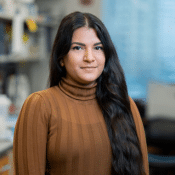Researcher Spotlight: Paurnima Patil, PhD
memorial sloan kettering cancer center
Oliver W. Press, MD, PhD, Memorial Fellow

Dr. Patil’s research has identified a gene (ARHGEF2) that is multiplied in many cases of diffuse large B-cell lymphoma (DLBCL). The protein encoded by this gene, GEF-H1, plays a variety of roles in the cell, but it is not clear how these processes affect lymphoma formation. Dr. Patil’s Postdoctoral Fellowship project, therefore, aims to evaluate the potential role of GEF-H1 in B-cell development and lymphomagenesis. She hopes that this research will not only provide important insights into the origins of DLBCL but also help to identify potential targets that disrupt signaling pathways activated by GEF-H1 that can be therapeutically exploited to help patients. “My current project is deeply rooted in understanding novel molecular mechanisms, allowing me to contribute to the advancement of potential diagnostic precision and targeted treatment strategies,” she says.
Inspired by recent successes and advancements in the field, Dr. Patil is hopeful that her research will provide meaningful insights that will one day be used to help patients. “Lymphoma research is at the forefront of precision medicine, with rapid advancements in targeted therapies, immunotherapies, and molecular profiling,” she explains. “The success of clinical trials in recent years has transformed treatment landscapes, proving that research efforts can directly translate into improved survival rates and better quality of life for patients. The field’s constant evolution, the opportunities for interdisciplinary collaboration, and the direct clinical impact of new discoveries make it one of the most promising areas in
oncology today.”
Dr. Patil completed her graduate studies at the University of Ulm in Germany and is currently a postdoctoral fellow at Memorial Sloan Kettering Cancer Center. She was inspired to pursue a career in science early in life. “Growing up in a family with both parents in the science field, particularly with my father being a clinician, significantly shaped my interest in the medical sciences,” she explains. “I chose lymphoma research because it offers a unique intersection of complexity, innovation, and patient impact, and I am passionate about contributing to its future advancements.”
With the support of the Foundation’s Postdoctoral Fellowship Grant, Dr. Patil hopes to establish herself as an independent researcher focusing on bridging the gap between basic and translational research in lymphoma. “I aim to foster an environment where scientific innovation thrives and where I can mentor and train the next generation of researchers,” she says. “In doing so, I aspire to create a lasting impact in the field, both through my own discoveries and by inspiring young scientists to pursue impactful careers in lymphoma research.”
